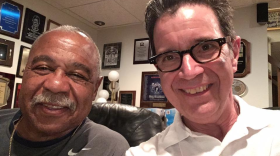Lansing is steadily becoming more diverse. According to the U.S. Census Bureau, the rate of people living in the city who identify as two or more races rose by over 62-percent between 2000 and 2010.
Stacey Tinsley was raised in Grand Ledge. Growing up, her experiences with race were somewhat limited.
“You know, I came from a super-Christian background so my parents never taught us anything about race," says Tinsley. "I mean, they loved everybody.”
But that changed when Stacey, now 39, was in high school. She started dating people of other races, exposing a side of her family she had never seen before.
“My grandfather had completely written me off," she said. "[He] told me that he wasn’t going to speak to me anymore.”
Kevin Tinsley, the man who would eventually be her husband, had a completely different childhood as a young black man growing up in the Midwest.
“In junior high, I had an experience where a kid felt he could call me the "N word" all year long," said Tinsley. "On the last day of school, when everyone was kind of an audience, he decided, 'you know I’m going to edge Kevin on, one more time,' and I snapped."
Kevin got into a fight and was suspended on his last day of school.
“At that moment I needed to defend my honor, so to speak, and also set a precedent because that was my last year of junior high," he said. "I didn’t want to go to high school with people thinking they could get away with it.”
Eventually, Kevin and and Stacey moved to Lansing. In 2006, they began dating.
“I can tell you this: when I was courting Stacey, her brother did warn me that her grandparents did not like black people,” he said.
Over time though, Stacey’s grandfather had a change of heart.
"Then, when me and Kevin got married, they became friends and I think he finally realized, you know, his ignorance, really," said Stacey. "But in his time, that wasn’t acceptable.”
Now living in South Lansing, the family says the city is welcoming and diverse.
“Quite frankly, I’ve seen more interracial couples, and not just your typical black and white, [like a] black man and white woman," said Stacey. "I’ve seen, you know, white man and black woman, I’ve seen Asian man and black woman. In Lansing, it’s a real nice cornucopia.”
“The Civil Rights Movement created a new climate across the country and younger people are much more tolerant of people of different backgrounds,” said Kevin.
Ruben Martinez is a professor of sociology and director of the Julian Samora Research Institute at Michigan State University. His work focuses on institutional and societal change. He sees these cultural shifts as a sign of the expanding diversity of the United States.
“Mixed-race and mixed-ethnic youth are increasing in number, and they are much more tolerant, less likely to be engaged in the old way of thinking about races,” said Martinez.
Although the country is moving towards becoming more diverse, Kevin still sometimes receives comments rooted in ignorance.
“I’ve often been told, 'you don’t sound black the phone,' and I don’t know what that means" he says. "You know, once they’ve met me. And you know I’m like 'what am I supposed to sound like…'”
The Tinsley’s children, 10 year-old Gavin and 7 year-old Macey, also have to put up with some uncomfortable situations. Stacey tells me how strangers at the store will often stop to feel their curly hair. But how do the kids feel about it?
“I really don’t care because I’m used to it--” Gavin starts, but before Gavin can finish his sentence, Macey takes the microphone away.
“It makes me feel weird and it makes me feel surrounded with people that wanna touch my hair and get all up in my space," Macey says.
Regardless, the family says they wouldn’t call any other place besides Lansing home.
“In my experience I would like to take Lansing elsewhere if I move away as far as the community is concerned,” says Kevin.





